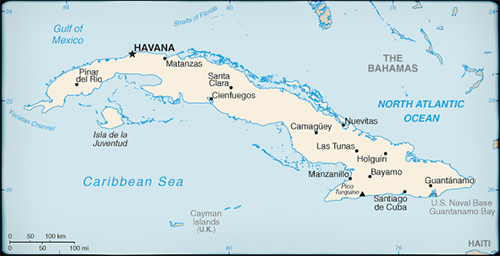Costa Rica has stumbled upon yet another obstacle in its quest to build a "humanitarian corridor" for the approximately 4,000 U.S.-bound Cubans stranded in Costa Rica by Nicaragua's refusal to let them cross into its territory.

After Nicaragua refused to re-open its border so the Cubans could continue their northward trek to the Rio Grande, Costa Rica turned to Guatemala and Mexico for alternative solutions. Costa Rica had hoped to circumvent Nicaragua by flying the Cuban migrants to Guatemala, from where they could then continue to the United States. However, Guatemala announced it will not allow the use of its territory to facilitate the relocation of the Caribbean migrants. According to Costa Rica's Foreign Minister Manuel Gonzalez, Guatemala gave several reasons for its rejection: it would be difficult to explain internally why Cuban migrants were given special treatment, internal problems dealing with mass deportations of Guatemalans from Mexico, the lack of a guarantee from the Mexican government that it would receive the thousands of Cubans, the economic cost for Guatemala were it to be part of the "corridor" (even after being assured there would be no costs for Guatemala), and security issues.
Gonzalez noted Guatemala's objection was a surprise, but said Costa Rica respects the decision made by Guatemala's temporary president, Alejandro Maldonado. This is a considerably friendlier response than Costa Rica's reaction to Nicaragua's opposition to the "corridor."
Costa Rica is now in negotiations with Belize, which borders on Guatemala and Mexico. Belize is scheduled to reply on Tuesday regarding whether it will serve as a ''launch pad'' for the Cuban migrants. Until then, Gonzalez has indicated that Costa Rica will continue to provide humanitarian assistance to the Cubans found in its territory, but clarified that if Belize agrees to receive the migrants it will be up to the Cuban nationals to pay for own travel costs. The Costa Rican Foreign Minister added, "the country is not under the condition to assume those costs," but will work with international organizations to negotiate with airlines to lower the airfare. Furthermore, if Belize accepts, Gonzalez indicated that the departure date of the Cuban migrants is undetermined and it should be expected that their departure will happen over time, just as they came over time and not all at once.
Costa Rican President Luis Guillermo Solis is scheduled to visit Cuba December 15-16 to normalize bilateral relations between the two countries, resumed in 2009. President Solis stated,''I hope that by then we have resumed the process of transferring the Cuban migrants, therefore, making it unnecessary that this be the priority of the trip.''
